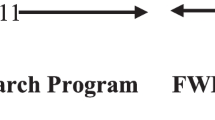Abstract
In this chapter, we address applications of the research-based knowledge targeting individuals, families, and communities. The Rural Families Speak (RFS) study demonstrates Boyer’s (1990) concept of the scholarship of engagement through discovery and application of knowledge. This chapter provides examples of programs based directly on RFS research findings. We then address ideas for future research using integration of scholarship and application to address the problems facing rural low-income families. Together, the examples answer the questions of what can be done with research-based knowledge. A table is provided to stimulate thinking about future-engaged scholarship for rural families.
Access this chapter
Tax calculation will be finalised at checkout
Purchases are for personal use only
Similar content being viewed by others
References
Boyer, E. L. (1990). Scholarship reconsidered: The Carnegie Foundation for the Advancement of Teaching. San Francisco: Jossey-Bass
Boyer, E. L. (1996). The scholarship of engagement. Bulleting of the American Academy of Arts and Sciences, 49(7), 18–33. http://www.jstor.org/stable/3824459.
Braun, B. (2007). Livin’ on the byways—Rural families speak. [Dramatization]. http://www.sph.umd.edu/fmsc/people/documents/LivinOnLifesByWays11-15-07.pdf.
Braun, B., & Bauer, J. (1998). Welfare reform: An opportunity to engage universities in community and economic development. Journal of Public Service and Outreach, 3, 33–37.
Braun, B., & Benning, L. (2001). Welfare reform 4 years later: The mobilization of the land-grant system. Journal of Extension, 39(3). http://www.joe.org/joe/2001june/comm1.php.
Braun, B., & Philogene, M. (2001). Employability task force welfare to work survey. Washington: National Association of State Universities and Land-Grant Colleges.
Braun, B., & Waldman, J. (2006). Engaging unheard voices. Final Report to the Kettering Foundation. http://www.sph.umd.edu/fmsc/fis/_docs/Engaging_Unheard_Voices.pdf.
Brewton, K. E. (2008). Qualitative analysis of the stress and coping experiences of low-income rural mothers raising a child with a disability. (Unpublished master’s thesis). University of Minnesota, St. Paul, MN.
Frazer, M. S. (2011). Poverty measurement and depression symptomatology in the context of welfare reform. (Unpublished doctoral dissertation). University of Minnesota, St. Paul, MN.
Fremstad, S., Ray, R., & Rho, H. J. (2008, May). Working families and economic insecurity in the States: The role of job quality and work supports. http://www.cepr.org/documents/publications/state_2008_05.pdf.
Greder, K., Brotherson, M. J., & Garasky, S. (2004). Listening to the voices of marginalized families. In C. L. Anderson (Ed.), Family and community policy: Strategies for civic engagement (pp. 95–116). Alexandria: American Association of Family and Consumer Sciences.
Johnson, R. C., Kalil, A., & Dunifon, R. E. (2010). Mother’s work and children’s lives: Low-income families after welfare reform. Kalamazoo: W. E Upjohn Institute for Employment Research.
Kelly, E. B. (2005). Leaving and losing jobs: Resistance of rural low-income mothers. Journal of Poverty, 9, 83–103. doi:10.1300/J134v09n01_05.
New Hampshire Statewide Earned Income Tax Credit Alliance. (n.d.). New Hampshire Earned Income Tax Credit. http://www.nheitc.org/home.htm.
Powell, S. E., & Bauer, J. W. (2010). Examining the resource use of low-income families caring for children with disabilities. Journal of Children & Poverty, 16(1), 67–83. doi:10.1080/10796120903575101.
Simmons, L. A., Braun, B., Carnigo, R., Havens, J. R., & Wright, D. W. (2008). Depression and poverty among rural women: A relationship of social causation or social selection? Journal of Rural Health, 24, 292–298. doi:10.1111/j.1748-0361.2008.00171.x.
Varcoe, K. P., Peterson, S. S., Johns, M., Grajales-Hall, M., Costello, C., & Breyer, K. (2008). Making every dollar count/Haga. render su dinero. (ANR Publication 3519). Oakland: University of California Regents.
Author information
Authors and Affiliations
Corresponding author
Editor information
Editors and Affiliations
Rights and permissions
Copyright information
© 2011 Springer Science+Business Media, LLC
About this chapter
Cite this chapter
Bauer, J.W., Dolan, E.M., Braun, B. (2011). Applications for the RFS Findings: Programs and Future Research. In: Bauer, J., Dolan, E. (eds) Rural Families and Work. International Series on Consumer Science. Springer, New York, NY. https://doi.org/10.1007/978-1-4614-0382-1_11
Download citation
DOI: https://doi.org/10.1007/978-1-4614-0382-1_11
Published:
Publisher Name: Springer, New York, NY
Print ISBN: 978-1-4614-0381-4
Online ISBN: 978-1-4614-0382-1
eBook Packages: Behavioral ScienceBehavioral Science and Psychology (R0)




